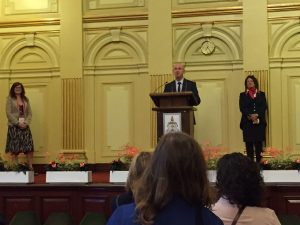Uganda’s National Development Plan (NDP) emphasizes among the strategic objectives under climate change, the need to promote a low carbon development pathway for the country and climate-proof the country’s national development.
A recent workshop convened by the Climate Change Department of the Ministry of Water and Environment in partnership with the United Nations Development Program (UNDP) and Makerere University Private Sector Forum, explored ways in which increased and more effective public-private cooperation could help accelerate progress towards this.
The UNDP Country Director, who was represented by the Assistant Country Director, Ms. Patience Lily Alidri, reiterated the importance of the private sector in climate change mitigation saying, “your partnership is essential in reducing emissions and adopting green growth development”.
The event brought together over 100 private sector representatives, technical experts, policy makers and agencies supporting greenhouse gas mitigation actions to explore opportunities for private sector engagement and financing in climate change mitigation activities and culminated in representatives of Uganda’s private sector signing a declaration to commit to reduce carbon emissions.
Climate change, a development challenge in Uganda
Climate change mitigation is important in Uganda’s context as effects such as floods, prolonged droughts and landslides are already affecting the livelihoods of millions of people. This is compounded by the growing industrialization and business enterprises that are polluting the environment.
Under the Kyoto Protocol to which Uganda is a signatory, countries agreed to reduce their greenhouse gas emissions through the Kyoto mechanisms such as emissions trading, the Clean Development Mechanism and joint implementation.
The private sector, important allies in climate change mitigation
Although Uganda’s private sector is one of the biggest emitters of carbon, it has been recognized that more could be done to provide the necessary support that would rally them to engage in, or finance, climate change mitigation actions.
The workshop therefore discussed many methods of engagement including; undertaking investment and technological innovations that strengthen low carbon growth, financing climate change mitigation measures, adopting lower carbon production processes and encouraging more climate conscious purchasing decisions by consumers.
In a speech read on his behalf by the Minister of State for the Environment, Ms Flavia Munaba Nabugera, the Prime Minister of the Republic of Uganda, Rt. Honorable, Dr. Ruhakana Rugunda said the climate change financing needs of Government are enormous and the public sector alone cannot sufficiently carry the burden of low-carbon development. “This means that the largest share of additional investment would have to come from the private sector, which is already responsible for the largest share of climate financing globally through the Climate Policy Initiative (CPI)”, he said.
In his keynote address delivered by the Executive Director for the Uganda Industrial Research Institute, Mr. Charles Mwesigwa, the Governor of the Bank of Uganda, Emmanuel Tumusiime-Mutebile challenged financial institutions to embrace climate change mitigation and called for the establishment of a Climate Investment Fund, which would complement existing bilateral and multilateral efforts. “These funds will scale up public and private finance for the deployment of clean technologies, the prevention of deforestation and development of climate resilient economies in developing countries”, he said.
Speaking on behalf of the Permanent Secretary for the Ministry of Water and Environment, Mr. Chebet Maikut, the Commissioner for Water and Environment and the national focal point for the United Nations Framework Convention on Climate Change (UNFCC) warned that businesses would be impacted by climate change, whether via their core operations, their supply chains, changes in customer demand, or larger macroeconomic shocks. “Therefore, it is time for the private sector to think carefully about what climate change may mean for their companies and to embrace climate change mitigation”, he said.
Spotting the opportunities on the horizon
Representatives of the private sector appreciated the workshop for not only creating awareness but also a platform for sharing information on funding opportunities and Clean Development Mechanisms in climate change mitigation.
“The private sector should not only look at climate change mitigation as a cost of production. There are business opportunities such as marine transport, recycling, renewable energy, gas production and water treatment,” said Ismail Muwanga, the Executive Director of Luuka Plastics, a local plastics manufacturing company.
Signing a declaration is a positive step by the private sector towards helping to reduce carbon emissions and achieve sustainable development. However, challenges such as competitiveness of low-carbon investment, uncertainty over actions by competitors and customer preferences, as well as the absence of a clear policy or regulatory framework may still affect their operations.
One way forward was suggested by Dr John-Hawkins Asiedu, Minister Counselor and Commercial at the Ghana Embassy in Turkey who shared Ghana’s experience in engaging the private sector in climate change mitigation. He advised that the first step is to cultivate an active and vibrant public–private partnership (PPP) that will participate in policy formulation to guide the process.
The workshop was organized under the auspices of the UNDP supported Low Emissions Capacity Building (LECB) project, being implemented by the Ministry of Water and Environment – Climate Change Department in collaboration with Makerere University Private Sector Forum.
Download copy of the news article


